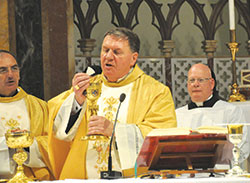In first homily, Cardinal Tobin says mercy always within reach

Cardinal Joseph W. Tobin elevates the Eucharist during a Nov. 20 liturgy in the Church of St. Alphonsus Liguori in Rome. Standing behind him is Loral Tansy, master of ceremonies. (Photo by John Shaughnessy)
By John Shaughnessy
ROME—Cardinal Joseph W. Tobin chose a place in his heart to share his first homily as a cardinal—the Church of St. Alphonsus Liguori in Rome.
The church is named for the founder of the Redemptorist order—the order in which Cardinal Tobin was ordained a priest in 1978. It’s also the home church of the general headquarters of the Redemptorists—the place that was his home when he served as the superior general of his order from 1997 to 2009.
The Church of St. Alphonsus Liguori is also meaningful to him because it’s the home of the icon of Our Lady of Perpetual Help, and the Blessed Mother has always been a major influence in his life.
In the beautiful, small church packed with people for evening Mass on Nov. 20, Cardinal Tobin delivered his homily first in Italian and then in English, accommodating Catholics from the local community, members of the Redemptorist order, and his friends and family from the United States, including a huge contingent from the Archdiocese of Indianapolis.
For his homily, Cardinal Tobin drew upon the experience of the outdoor morning Mass of Nov. 20 in St. Peter’s Square at the Vatican. During that Mass, Pope Francis closed the Holy Doors of Mercy at St. Peter’s Basilica, symbolically closing the Church’s Holy Year of Mercy around the world.
Here is the essence of his first homily as a cardinal:
“I think for most of us perhaps, at least the question crossed our mind, ‘What does it mean to close the Door of Mercy?’ Is it possible that mercy is now beyond our reach? Perhaps that’s why our Holy Father chose to close the Year of Mercy today, on the feast of Christ the King—because the feast reminds us of the story of the King who dies from love.
“People make fun of it. They say, ‘What sort of God would allow his Messiah to die the way Jesus died?’ But he dies with his arms open, nails in, to remind us that there are some things more important than life. And one of those things, perhaps the only thing more important than life itself, is love. The true grace of God that we see in Jesus crucified is a clear sign that mercy was not ended.
“The words of Jesus to that dying thief, who simply wanted to be remembered when Jesus entered his kingdom, should give all of us hope: ‘Today you will be with me in paradise’ [Lk 23:43]. Today—because love is always in a hurry. Love always wants to go where it should go—to the beloved. To be with me. I want you in paradise.
“And so we close a door today, but we recognize a King. And our mother Mary, who is given to us as the mother who is always ready to help us, presents us the reason for our hope. Those elongated figures of hers in the icon point to Jesus, the only Savior in the world, the more simple face of God.” †
